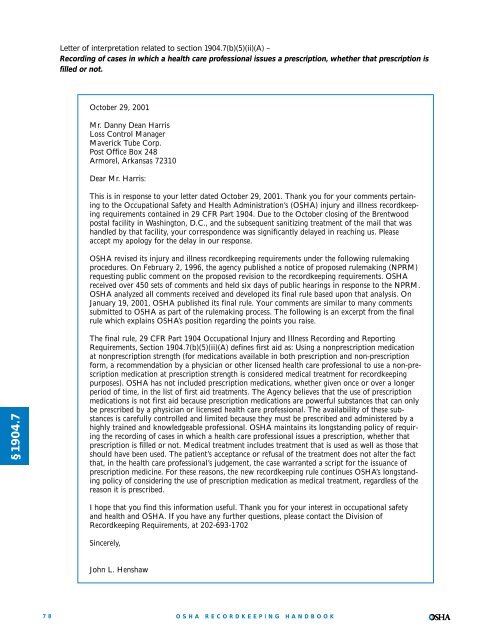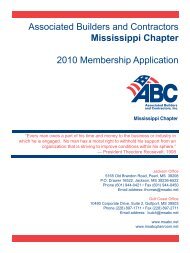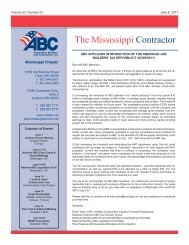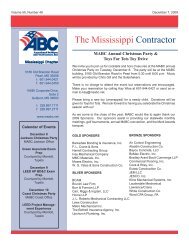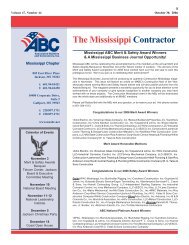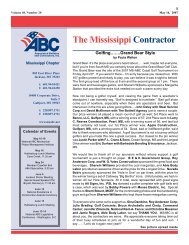Letter of interpretation related to section 1904.7(b)(5)(ii)(A) –Recording of cases in which a health care professional issues a prescription, whether that prescription isfilled or not.October 29, 2001Mr. Danny Dean HarrisLoss Control ManagerMaverick Tube Corp.Post Office Box 248Armorel, Arkansas 72310Dear Mr. Harris:This is in response to your letter dated October 29, 2001. Thank you for your comments pertainingto the Occupational Safety and Health Administration’s (<strong>OSHA</strong>) injury and illness recordkeepingrequirements contained in 29 CFR Part 1904. Due to the October closing of the Brentwoodpostal facility in Washington, D.C., and the subsequent sanitizing treatment of the mail that washandled by that facility, your correspondence was significantly delayed in reaching us. Pleaseaccept my apology for the delay in our response.<strong>OSHA</strong> revised its injury and illness recordkeeping requirements under the following rulemakingprocedures. On February 2, 1996, the agency published a notice of proposed rulemaking (NPRM)requesting public comment on the proposed revision to the recordkeeping requirements. <strong>OSHA</strong>received over 450 sets of comments and held six days of public hearings in response to the NPRM.<strong>OSHA</strong> analyzed all comments received and developed its final rule based upon that analysis. OnJanuary 19, 2001, <strong>OSHA</strong> published its final rule. Your comments are similar to many commentssubmitted to <strong>OSHA</strong> as part of the rulemaking process. The following is an excerpt from the finalrule which explains <strong>OSHA</strong>’s position regarding the points you raise.§1904.7The final rule, 29 CFR Part 1904 Occupational Injury and Illness Recording and ReportingRequirements, Section 1904.7(b)(5)(ii)(A) defines first aid as: Using a nonprescription medicationat nonprescription strength (for medications available in both prescription and non-prescriptionform, a recommendation by a physician or other licensed health care professional to use a non-prescriptionmedication at prescription strength is considered medical treatment for recordkeepingpurposes). <strong>OSHA</strong> has not included prescription medications, whether given once or over a longerperiod of time, in the list of first aid treatments. The Agency believes that the use of prescriptionmedications is not first aid because prescription medications are powerful substances that can onlybe prescribed by a physician or licensed health care professional. The availability of these substancesis carefully controlled and limited because they must be prescribed and administered by ahighly trained and knowledgeable professional. <strong>OSHA</strong> maintains its longstanding policy of requiringthe recording of cases in which a health care professional issues a prescription, whether thatprescription is filled or not. Medical treatment includes treatment that is used as well as those thatshould have been used. The patient’s acceptance or refusal of the treatment does not alter the factthat, in the health care professional’s judgement, the case warranted a script for the issuance ofprescription medicine. For these reasons, the new recordkeeping rule continues <strong>OSHA</strong>’s longstandingpolicy of considering the use of prescription medication as medical treatment, regardless of thereason it is prescribed.I hope that you find this information useful. Thank you for your interest in occupational safetyand health and <strong>OSHA</strong>. If you have any further questions, please contact the Division of<strong>Recordkeeping</strong> Requirements, at 202-693-1702Sincerely,John L. Henshaw78<strong>OSHA</strong> RECORDKEEPINGHANDBOOK
Section 1904.8Recording criteria for needlestick and sharps injuries(66 FR 6123, Jan. 19, 2001)REGULATION: Section 1904.8Subpart C – <strong>Recordkeeping</strong> Forms and Recording Criteria (66 FR 6123, Jan. 19, 2001)Note to Subpart C: This Subpart describes the work-related injuries and illnesses that an employer mustenter into the <strong>OSHA</strong> records and explains the <strong>OSHA</strong> forms that employers must use to record work-relatedfatalities, injuries, and illnesses.Section 1904.8 Recording criteria for needlestick andsharps injuries (66 FR 6128, Jan. 19, 2001)(a) Basic requirement.You must record all work-related needlestick injuriesand cuts from sharp objects that are contaminatedwith another person’s blood or other potentiallyinfectious material (as defined by 29 CFR 1910.1030).You must enter the case on the <strong>OSHA</strong> 300 Log as aninjury. To protect the employee’s privacy, you maynot enter the employee’s name on the <strong>OSHA</strong> 300 Log(see the requirements for privacy cases in paragraphs1904.29(b)(6) through 1904.29(b)(9)).(b) Implementation.(1) What does “other potentially infectious material”mean?The term “other potentially infectious materials” isdefined in the <strong>OSHA</strong> Bloodborne Pathogens standardat Section 1910.1030(b). These materials include:(i) Human bodily fluids, tissues and organs, and(ii) Other materials infected with the HIV or hepatitisB (HBV) virus such as laboratory cultures or tissuesfrom experimental animals.(2) Does this mean that I must record all cuts, lacerations,punctures, and scratches?No, you need to record cuts, lacerations, punctures,and scratches only if they are work-related andinvolve contamination with another person’s blood orother potentially infectious material. If the cut, laceration,or scratch involves a clean object, or a contaminantother than blood or other potentially infectiousmaterial, you need to record the case only if it meetsone or more of the recording criteria in Section1904.7.(3) If I record an injury and the employee is laterdiagnosed with an infectious bloodborne disease, doI need to update the <strong>OSHA</strong> 300 Log?Yes, you must update the classification of the caseon the <strong>OSHA</strong> 300 Log if the case results in death,days away from work, restricted work, or job transfer.You must also update the description to identify theinfectious disease and change the classification of thecase from an injury to an illness.(4) What if one of my employees is splashed orexposed to blood or other potentially infectiousmaterial without being cut or scratched? Do I needto record this incident?You need to record such an incident on the <strong>OSHA</strong>300 Log as an illness if:(i) It results in the diagnosis of a bloodborne illness,such as HIV, hepatitis B, or hepatitis C; or(ii) It meets one or more of the recording criteriain Section 1904.7.PREAMBLE DISCUSSION: Section 1904.8(66 FR 5998-6003, Jan. 19, 2001)The following are selected excerpts from the preamble to the Occupational Injury and Illness Recording andReporting Requirements, the <strong>Recordkeeping</strong> rule (66 FR 5916, 29 CFR Parts 1904 and 1952). These excerptsrepresent some of the key discussions related to the final rule (66 FR 6122, 29 CFR Parts 1904 and 1952).§1904.8Section 1904.8 Additional recording criteria forneedlestick and sharps injuriesSection 1904.8 of the final rule deals with the recordingof a specific class of occupational injuries involvingpunctures, cuts and lacerations caused by needlesor other sharp objects contaminated or reasonablyanticipated to be contaminated with blood orother potentially infectious materials that may lead tobloodborne diseases, such as Acquired ImmunodeficiencySyndrome (AIDS), hepatitis B or hepatitis C.The final rule uses the terms “contaminated,” “otherpotentially infectious material,” and “occupational<strong>OSHA</strong> RECORDKEEPINGHANDBOOK79
- Page 1 and 2:
www.osha.govOSHARecordkeepingHandbo
- Page 3 and 4:
OSHARecordkeeping HandbookThe Regul
- Page 5 and 6:
ContentsRecordkeeping HandbookRoadm
- Page 7 and 8:
Section 1904.40Providing records to
- Page 9 and 10:
Section 1904.0Purpose(66 FR 6122, J
- Page 11 and 12:
Section 1904.1Partial exemption for
- Page 13 and 14:
Section 1904.2Partial exemption for
- Page 15 and 16:
employees, to OSHA within 8 hours (
- Page 17 and 18:
Partial Exemptions for Employers Un
- Page 19 and 20:
Section 1904.4Recording criteria(66
- Page 21 and 22:
Section 1904.5Determination of work
- Page 23 and 24:
(b)(7) How do I decide if a case is
- Page 25 and 26:
well, including providing informati
- Page 27 and 28:
This exception, which responds to i
- Page 29 and 30:
or she is in the work environment a
- Page 31 and 32:
have occurred but for the occupatio
- Page 33 and 34:
considered work-related. If an empl
- Page 35 and 36: Question 5-12. Is work-related stre
- Page 37 and 38: • The doctor described the illnes
- Page 39 and 40: Scenario 7:• A site hired numerou
- Page 41 and 42: Letter of interpretation related to
- Page 43 and 44: These principles should be applied
- Page 45 and 46: The problem with the response is tw
- Page 47 and 48: Section 1904.6Determination of new
- Page 49 and 50: the Guidelines stated that “the a
- Page 51 and 52: estricted work. If the case is a pr
- Page 53 and 54: • The doctor also prescribed the
- Page 55 and 56: • The employees were under the di
- Page 57 and 58: Section 1904.7General recording cri
- Page 59 and 60: (iii) Do I have to record restricte
- Page 61 and 62: of the length of time the employee
- Page 63 and 64: then result in days away from work
- Page 65 and 66: A partial day of work is recorded a
- Page 67 and 68: In all other respects, the final ru
- Page 69 and 70: ments. The Agency believes that the
- Page 71 and 72: e recorded because it will require
- Page 73 and 74: However, episodes of fainting from
- Page 75 and 76: care professional, he or she may al
- Page 77 and 78: “Other simple means” of removin
- Page 79 and 80: For purposes of OSHA recordkeeping
- Page 81 and 82: • When answering the doctor’s q
- Page 83 and 84: Response: In the recordkeeping regu
- Page 85: Letter of interpretation related to
- Page 89 and 90: caused by contaminated needles and
- Page 91 and 92: Section 1904.9Recording criteria fo
- Page 93 and 94: Section 1904.10Recording criteria f
- Page 95 and 96: hearing loss case that is not relat
- Page 97 and 98: average of 10 decibels or more at 2
- Page 99 and 100: argued that because the function of
- Page 101 and 102: occurs, and where hearing loss can
- Page 103 and 104: cases in their workplace via analys
- Page 105 and 106: March 4, 2004Mr. Carl O. Sall, CIHD
- Page 107 and 108: When the professional evaluating th
- Page 109 and 110: (2) May I line-out or erase a recor
- Page 111 and 112: Section 1904.12Recording criteria f
- Page 113 and 114: These new statistics would add only
- Page 115 and 116: Sections 1904.13 - 1904.28 Reserved
- Page 117 and 118: two lines of the OSHA 300 Log to de
- Page 119 and 120: which replace the OSHA 200 and 101
- Page 121 and 122: different types of occupational ill
- Page 123 and 124: OSHA 301 form. These data are usefu
- Page 125 and 126: LETTERS OF INTERPRETATION: Section
- Page 127 and 128: Question 2: Under 29 CFR Section 19
- Page 129 and 130: and has adopted language in the fin
- Page 131 and 132: Section 1904.31Covered employees(66
- Page 133 and 134: label assigned to a worker is immat
- Page 135 and 136: These workers should be evaluated j
- Page 137 and 138:
Response: A case is work-related if
- Page 139 and 140:
Response: Section 1904.31 states th
- Page 141 and 142:
Thank you for your interest in occu
- Page 143 and 144:
year covered by the summary. The su
- Page 145 and 146:
2. Number of employees and hours wo
- Page 147 and 148:
LETTERS OF INTERPRETATION: Section
- Page 149 and 150:
Section 1904.33Retention and updati
- Page 151 and 152:
June 23, 2003Mr. Edwin G. Foulke, J
- Page 153 and 154:
Section 1904.34Change in business o
- Page 155 and 156:
PREAMBLE DISCUSSION: Section 1904.3
- Page 157 and 158:
Incident Report (Forms 300 and 301,
- Page 159 and 160:
workers’ compensation claim. See
- Page 161 and 162:
LETTERS OF INTERPRETATION: Section
- Page 163 and 164:
Letter of interpretation related to
- Page 165 and 166:
Question 3: Using the facts in Ques
- Page 167 and 168:
Section 1904.37State recordkeeping
- Page 169 and 170:
tion, require employers to report f
- Page 171 and 172:
(5) If I receive a variance, may th
- Page 173 and 174:
Section 1904.39Reporting fatalities
- Page 175 and 176:
gation. Therefore, the final rule d
- Page 177 and 178:
Section 1904.40Providing records to
- Page 179 and 180:
ness. The government inspector may
- Page 181 and 182:
Response: The controlling employer
- Page 183 and 184:
FREQUENTLY ASKED QUESTIONS: Section
- Page 185 and 186:
OSHA and the BLS have worked togeth
- Page 187 and 188:
provide copies of the retained reco
- Page 189 and 190:
FREQUENTLY ASKED QUESTIONS: Section
- Page 191 and 192:
Section 1904.46Definitions(66 FR 61
- Page 193 and 194:
of business information. For exampl
- Page 195 and 196:
inconvenience associated with keepi
- Page 197 and 198:
skin disease, respiratory disorder,
- Page 199 and 200:
Question 2: Under 29 CFR Section 19
- Page 201:
www.osha.gov


